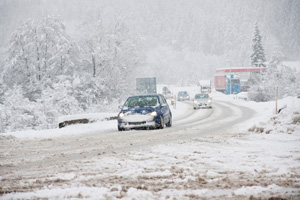Is There a Higher Standard of Care When Driving in Ice and Snow?
 Under the laws governing negligence in Pennsylvania, all persons in society have a duty at all times to use reasonable care. That extends to the operation of a motor vehicle. When you are on the road in Pennsylvania, you must obey the speed limit, as well as other traffic laws, in part to minimize the risk of injury to other motorists.
Under the laws governing negligence in Pennsylvania, all persons in society have a duty at all times to use reasonable care. That extends to the operation of a motor vehicle. When you are on the road in Pennsylvania, you must obey the speed limit, as well as other traffic laws, in part to minimize the risk of injury to other motorists.
If you’ve driven in a Pennsylvania winter, though, you know that driving on ice and snow is a different experience than driving on a dry road. Does the same “reasonable care” standard apply to motorists driving in a Pennsylvania winter? Or do they have to exercise a higher level of care, given the conditions?
Applying Negligence Principles to Winter Driving
No specific statute or written law mandates a higher or different degree of care from motorists driving in snow and ice in Pennsylvania. The legal principle of negligence, though, requires that a person take into consideration all extenuating circumstances when determining what behavior is reasonable. Accordingly, if you operate a motor vehicle during the winter in Pennsylvania, you must pay attention to whether it’s snowing, whether the snow is turning to ice, how much snow is on the road, how it’s affecting your ability to control your vehicle, and whether you need to make changes to respond to weather conditions. For example, should you drive slower than the posted speed? Should you put your bright lights on? Should you pull off the road and wait to see if the weather improves? There’s no hard and fast rule about what’s reasonable, but if you are involved in an accident, you can expect that a jury will ask those same questions.
Contact Barnard, Mezzanotte, Pinnie & Seelaus
At Barnard, Mezzanotte, Pinnie & Seelaus, we have protected the rights of personal injury victims in Pennsylvania since 1980. We offer a free initial consultation. We are currently communicating with clients by phone, text message, e-mail, and videoconference. To schedule an appointment, call us at 610-565-4055 or contact us online.

